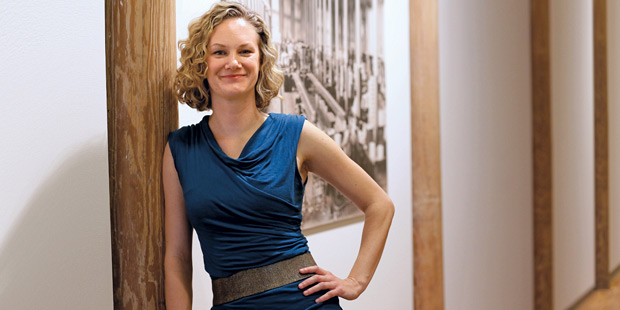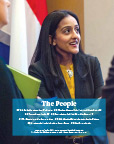A Legal Prescription for Health
Printer Friendly VersionAlthough the US Department of Veterans Affairs (VA) provides health care and other aid to veterans, it does not provide legal assistance. Margaret Middleton ’07 finds that helping veterans with their legal issues can actually be a key element to improving their mental health. She is executive director and co-founder of the Connecticut Veterans Legal Center (CVLC), which aims to help veterans in need.
In 2014, CVLC received a grant from the Bristol- Myers Squibb Foundation to evaluate the effect of legal aid on veterans’ mental health and well-being. “The value of what we provide isn’t just in whether you have a great legal outcome; it’s also that you might be less likely to use the emergency room, or to have an extended hospital stay,” says Middleton. She hopes that this study will provide further evidence for the efficacy of integrating legal, mental, and medical aid. “Ultimately, we would love the VA nationally to recognize the value of this model and adopt it as part of the spectrum of services that they provide veterans,” she says.
Middleton did not plan for her career to follow this particular path. A Root-Tilden-Kern D’Agostino Scholar at NYU Law, Middleton credits her experience as a student in the Family Defense Clinic taught by Fiorello LaGuardia Professor of Clinical Law Martin Guggenheim ’71 with igniting her passion for representing communities in need. “The clinic helped open my mind in terms of what a vulnerable community is,” Middleton says. “Veterans, historically, haven’t been embraced as a population of high need by the legal services community. In part because of my experience in that clinic, I was open to a broader conception of who lawyers can help.”
Guggenheim, who remembers his former student as “an outstanding member of the community, a very vibrant person,” says that one’s choice to fight a social injustice may look random to others but naturally follows when a person realizes “not enough people are troubled by what’s going on in that particular area, and that’s exactly what happened to Margaret.”
After law school, Middleton worked as a Thomas Emerson Fellow at David Rosen & Associates, a New Haven law firm that focuses on human rights and public interest law. Moved by stories that she had heard on the radio about veterans with insufficient access to mental health care, Middleton volunteered at the Errera Community Care Center, which is part of the Connecticut VA. There, she met fellow volunteer Howard Udell ’65, who had retired as the chief legal officer of Purdue Pharma. “When they found out that he was a lawyer, the veterans would just pop in and say, ‘Hey, I have a quick question about a legal issue,’” Middleton says. “By the time I met him, Howard had taken on 30 clients that way, totally incidentally.”
Middleton and Udell both recognized that veterans needed greater access to legal services, so together they founded CVLC with a grant from the Initiative for Public Interest Law at Yale. When the center launched in 2009, Middleton was the only full-time employee; Udell was a volunteer adviser. Now the center has seven full-time staffers and has recruited more than 600 Connecticut lawyer volunteers. “Meeting and working with Howard was one of the greatest strokes of luck in my life,” Middleton says of her co-founder, who passed away in August 2013. “It’s rare that you get to meet someone who is as kind and brilliant and funny as Howard was, and it was an incredible gift to have a partner in doing something like this, so that we both equally owned the joy of doing the work and the stress of trying to make it happen.”
—
Related Link
“Featured Alumna: Margaret Middleton ’07”
NYU Law website, 11/1/14
—


 Multimedia
Multimedia